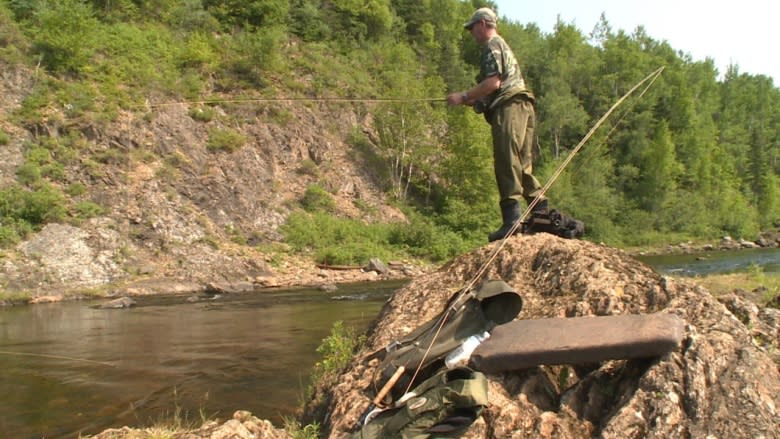Catch and release notion spawns debate about 2018 salmon strategy
Salmon fishermen are divided over how the upcoming angling season should be managed on Newfoundland's rivers.
There were so few fish last summer, Fisheries and Oceans Canada (DFO) decided to close rivers on the island to retention fishing, only allowing catch and release.
The Atlantic Salmon Federation (ASF) is urging caution in a new management plan — expected in May.
"The most prudent course would be to open with live-release angling until a mid-season review of returns," ASF's Neville Crabbe told the St. John's Morning Show.
"If there are good signs of a recovery at that point and it looks like the monitored rivers are going to be close to or hitting their conservation requirements, then we could reinstate some form of retention angling."
That's not sitting well with some fishermen, who dispute the scientific evidence and question the fairness of a catch and release only policy.
Some members of the Citizens Outdoor Rights Alliance took their concerns to a meeting with DFO recently in Gander.
"It's our belief that it has to be a balanced and a fair plan. Fair to both groups of anglers — hook and release and retention anglers," said Gary Gale, who attended the meeting.
"If there's to be pain, it should be equally shared by both groups. This is what we consider to be fair."
Gale thinks starting the 2018 salmon season with a policy from last year is questionable, given that 2017 was an exceptional year in terms of sea ice lasting well into the summer followed by dry weather which led to low water levels.
He said anecdotal evidence from anglers showed that the salmon runs were just late and were quite plentiful even in the days before the ban on retention.
Questions science
Gale called the ban a "knee jerk" reaction to low numbers from a few isolated samples.
"The science has to be much better. In our view the sample has to be much bigger. I believe they assessed 14 rivers. We believed that it has to be much bigger than that," he said.
"We believe that the traditional knowledge of locals needs to be used in terms of any scientific model that's used."
Gale wouldn't say whether he and other anglers might disobey a catch and release policy.
Meanwhile, Crabbe agreed that assessments of salmon numbers could be better, but said it's still important to put stock in the scientific data.
He doesn't like the idea of two groups of anglers being at odds given that salmon fishing should be a positive thing for the province, and hopes a solution can be found that will allow people to fish without threatening the resource.
"People were satisfied with the system for the last 20 years when it was delivering six tags to everybody that purchased a licence. But now that system is telling us there are problems," he said.
"ASF believes that live-release angling is a better alternative to total closure."



